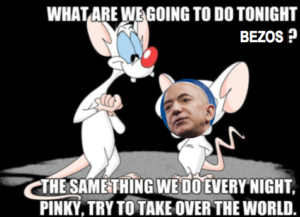Business & Money
Amazon has an incredible business model. Start by building an e-commerce platform to sell books. Once at scale, allow anyone selling anything to leverage that platform to sell their own goods for a nominal fee. In the process of building this massive marketplace, create a powerhouse of a logistics network (warehouses, software, supply chain expertise, etc) to facilitate all of this activity. Once at scale, allow manufacturers and retailers to leverage these same logistics services and facilities for a nominal fee. In the process thereof, build out world-class cloud infrastructure for all of your own storage, processing, and computing needs. Once at scale with these efforts, allow any other company to leverage these same cloud services for a nominal fee.
It’s an absolutely genius model that continues to pour more and more gasoline on the fire that fuels growth. One hell of a flywheel!
This model shows no signs of slowing down. You may have read about how Amazon is experimenting with physical grocery stores where customers can simply walk in, grab what they want, and leave without stopping at a cash register. Or perhaps you’ve come across the fact that they’re leasing planes and investing in their own cargo hub in Kentucky. I’d say it’s pretty safe to assume that, once they figure out the model, the self-checkout technology will be offered to other retailers and the cargo hub will service the other logistics companies (of course for that not so nominal fee).
So, despite Amazon shares being crazy expensive (P/E ratio of 180.56), it may yet be undervalued. The company accounts for only 5% of retail sales (half the share of Walmart) and e-commerce still accounts for a single-digit percentage of all retail sales.
If you couldn’t tell, I am looooong Amazon!

Human Progress
Steve Mnuchin, the Treasury Secretary of the US, might be off his 💊💊.
“I think that is so far in the future – in terms of artificial intelligence taking over American jobs – I think we’re like so far away from that, that uh [it’s] not even on my radar screen. Far enough that it’s 50 or 100 years away.”
Are you f*&%$* kidding me??? I don’t think I’ve ever disagreed more with a single statement. This guy must be off his rocker.
Now, I don’t want to spend valuable time deriding this guy, but let’s focus on the crux of the issue. Why is artificial intelligence, or machine learning (ML) more specifically, important? Computer scientists have been touting its power and potential for decades and we have nothing to show for it except for movie recommendation algorithms and autonomous vacuum cleaners. Why is this time different?
I’ll tell you why this time is different. It has to do with something very fundamental to where we are with regards to this technology.
First, a definition. Now, I’m no engineer or machine learning expert, so I won’t even attempt to get technical here. In my own laymen terms, ML involves computers learning from lots and lots of data. You’ve likely taken a basic statistics class at some point. Do you remember covering probability? Simply calculating the likelihood of a future event based on historical data points? For all intents and purposes, that’s ML. Whether you want to talk about facial recognition, translation, product recommendations, self-driving cars, or anything else. It’s just looking at a bunch of data and past events, and using that to predict the future.
With that out of the way, we can get back to why this time is different. Throughout the history of technology, we’ve been building machines to work for us. Steam engines, the printing press, cars… All of these things burn fuel to do work so that we don’t have to and faster than we would be able to on our own. But, as wonderful as they all are, these machines are not “creators.” By that I mean, they have no ability to create anything outside of what is hard coded by human beings. Once you turn on the printing press, it will continually print things exactly the same way over and over again until the energy source is depleted or the machine breaks down. At no point will the machine figure out a better way to print something. Only a human being can design a better machine to replace the old one. This has been the model for technology since time immemorial.
With machine learning this changes. Take speech translation for example. When early translation programs were developed, the software was very simple. Here is the English dictionary. Here is the Spanish dictionary. Replace each word with its equivalent in the opposite language and voila. Translation! Of course, this fails because that is not how translation works. It isn’t a word for word type of thing. Different languages have different ways of conveying tone, capturing tense, etc. With the latest incarnation of Google translate, however, we have a whole separate ball game. The algorithm can look the entire library of books, articles, speeches, web pages, etc that have been translated into another language and start to predict how a sentence should be translated. What’s more, as the system takes in more translation examples and receives feedback, the algorithm can actually learn and improve mid-flight. That is, without human intervention, the translation service actually improves over time. That’s bananas!! 🍌🍌🍌🍌🍌
This is what Mr. Mnuchin is not understanding. This is not like other technologies where we invented something new that was better at doing a job. We have computers getting “smarter” by themselves.
Now I don’t want to overstate this. The capabilities are still very narrow. Each ML system is very good at one specific thing, but completely incompetent with regards to every other domain. None the less, this is a big deal.
Further, in addition to the fundamental difference just described, the speed of proliferation will be unprecedented. If we go back to the printing press and steam engine example, once these technologies were developed, it might take years or decades for the technology to spread across the globe. In the digital era, this is not the case. When talking about software and other digital goods, things can spread instantaneously, the cost of distribution is 0, and the marginal cost of creating another unit, also 0. When a new algorithm or application is created, you click a button and it is available in every corner of the globe. Again, 🍌🍌🍌🍌🍌!!
With these two fundamental differences, that is the machines playing the “creator” role and the speed at which these things can spread, we’re in uncharted territory.
Philosophy
A few days ago my fiancé made Tteok-bokki (pronounced “duck-bogi”). It’s a stir-fried Korean dish with fish cakes, rice cakes, boiled eggs, onions, and red pepper paste (among other things).

While she was cooking, she was multitasking with a few other things, so asked me to stir the pan. As I began to stir, the dish seemed overly watery. I opened my mouth to ask the question, “It’s a bit watery, no?” But then I paused. There was a slight a fear of being punched in the face, but more so, a realization that I should wait to ask the question. She’s made this dish countless times and perhaps it congeals as it cooks.
That’s exactly what happened. it was absolutely perfect. In fact, probably the best she has ever made!
This got me thinking about asking questions more generally. There are many times when I’m in a meeting at work or having a discussion with a friend and something that’s said doesn’t sit well with me. I either don’t fully understand or I simply disagree. But, usually, it serves me well to let someone fully articulate an idea or complete a thought before butting in with a question. Often times the idea makes a lot more sense in the full context of what’s being said, or at least you can see the other’s perspective with more clarity.
My Latest Discovery
I’ve been using the Via ride sharing app as of late. It’s essentially Uber Pool or Lyft Line, without the option to take a ride by yourself. It’s “ride sharing” in it’s purest form. They operate a fleet of Mercedes vans that seat up to 6 passengers. Due to the purely “shared” model, prices are far lower than they are with Uber & Lyft. It cost me $8 for a ride from Long Island City to the Flatiron district. The only downside is that you occasionally have to walk a few blocks for pickup in order to best optimize routing. Not a big deal if you ask me. If you’d like $10 in free ride credit and want to help me out as well 😊, my referral code is “jeremy2e7”.
Question Of The Week
We all have so many identities. I myself am a friend, soon-to-be husband, dog parent, salesperson, black, American (purposely separated those 2), student, NYC resident, etc.
How do you prioritize your various identities? Is there a rank order? What happens when two of these are in conflict?
Looking forward to hearing your thoughts! Onwards and upwards amigos(as)!